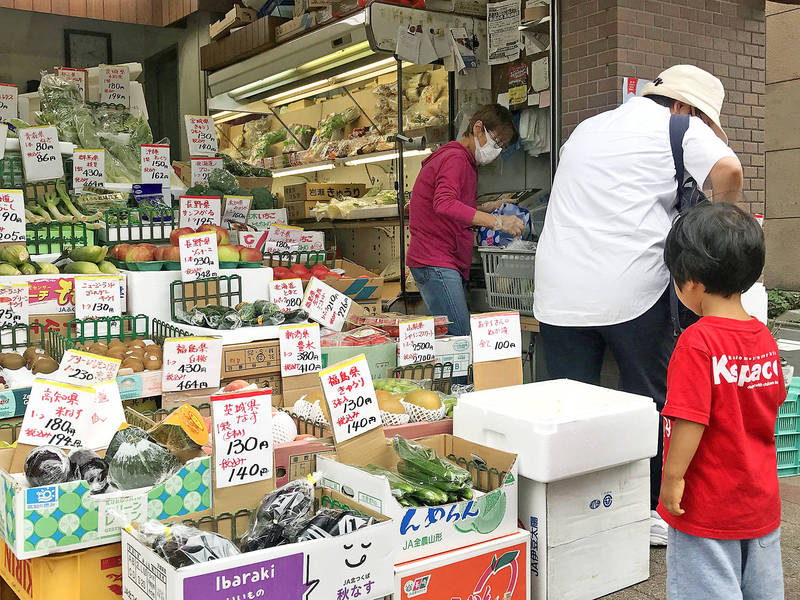《TAIPEI TIMES》 Talks focus on ending Japan food ban

Agricultural products showing their places of origin — including Fukushima and Ibaraki prefectures — are displayed at a shop in Tokyo on Sept. 1 last year. Photo: CNA
NO TIMETABLE: The Executive Yuan, ministers and the DPP caucus held a meeting on the possibility of removing a ban on food products from five Japanese prefectures
By Lee Hsin-fang, Lin Liang-sheng and Kayleigh Madjar / Staff reporters, with staff writer
The government appears poised to eliminate a ban on agricultural imports from five Japanese prefectures that was implemented following the 2011 Fukushima Dai-ichi nuclear power plant disaster, although extensive conversations would be held before a date to lift the ban is set, a person familiar with the matter said.
Initial talks about the possibility of removing the ban were held on Friday between members of the Executive Yuan, heads of several ministries and the Democratic Progressive Party (DPP) caucus.
No timetable was presented, although the accelerated pace of discussion suggests that the government intends to move forward.
As for when an announcement could be expected, a government official said on condition of anonymity that senior officials have yet to make a decision.
Council of Agriculture Minister Chen Chi-chung (陳吉仲) told the meeting that Taiwan’s food safety inspection standards are stricter than those set by the UN’s Codex Alimentarius Commission, the US and the EU.
Executive Yuan spokesman Lo Ping-cheng (羅秉成) added that Taiwan opposes all radioactive contamination, and would comply with international standards and scientific evidence when importing any food products.
During deliberations, officials and lawmakers also raised concerns about calling agricultural products from the five prefectures “nuclear food” in Chinese, instead suggesting that they be referred to as “agricultural products from Fukushima and surrounding areas.”
A person familiar with the discussions said that the DPP lawmakers in attendance unanimously supported the idea of removing the ban.
Once the ban is lifted, the Cabinet reportedly plans to improve messaging about importation safety standards to reassure the public.
The ban on food imports from Fukushima, Gunma, Chiba, Ibaraki and Tochigi prefectures was implemented over fears of radioactive contamination. Only Taiwan, South Korea and China maintain bans, while the US, the EU and other nations have resumed imports.
Taiwan’s ban has drawn repeated protests from Tokyo and raised concern that it could affect Taipei’s application to join the Comprehensive and Progressive Agreement for Trans-Pacific Partnership.
A referendum to maintain the ban, held in November 2018, passed by a 78-22 percent margin, but the result was legally binding for only two years.
Meanwhile, the Chinese Nationalist Party (KMT) yesterday clarified its stance on the issue after coming under fire from within the pan-blue camp for saying that it tentatively supports resuming imports from the prefectures.
The party in a statement on Friday said it would agree to resuming imports “as long as Japan can guarantee their safety.”
Broadcasting Corp of China chairman Jaw Shaw-kong (趙少康) on Saturday said he “almost fainted” when he read the statement, adding that the KMT has always been opposed to the imports, but now suddenly wants to cozy up to the DPP by presenting it with a “huge gift.”
Overall agricultural imports from Japan were not affected by the ban, instead increasing by 50 to 100 percent since it was implemented, he added.
The DPP is to present a set of data to support its plan, so it is the KMT’s duty to present data in opposition, Jaw said, adding that there is “no other path.”
“It is impossible to please everyone,” he added.
KMT Chairman Eric Chu (朱立倫) yesterday said that the party is “100 percent opposed” to anything that harms public health and would collect information on the matter to share with the public.
However, if the DPP uses so-called international exchanges for political gain, the KMT would be vehemently opposed, he added.
新聞來源:TAIPEI TIMES















